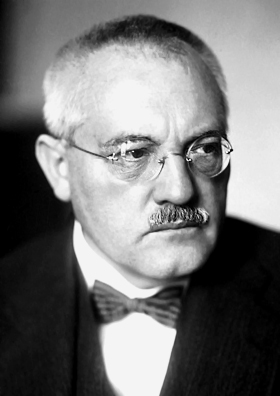Carl Bosch
Carl Bosch (27 August 1874 – 26 April 1940) was a German chemical engineer and chemist who was a key figure in the development of the Haber-Bosch process, which is used for the synthesis of ammonia from nitrogen and hydrogen gases. This process played a significant role in the advancement of agricultural fertilizer production, significantly impacting global agriculture. Bosch's contributions to chemistry and chemical engineering were recognized with the Nobel Prize in Chemistry in 1931, which he shared with Friedrich Bergius for their contributions to the invention and development of chemical high-pressure methods.
Early Life and Education[edit | edit source]
Carl Bosch was born in Cologne, Germany, into a well-off family. His father was a successful businessman, which allowed Bosch to receive a quality education. He showed an early interest in the natural sciences and went on to study at the Technical University of Charlottenburg (now part of the Berlin Institute of Technology) and the University of Leipzig, where he focused on chemistry.
Career[edit | edit source]
After completing his education, Bosch began working at BASF, a German chemical company. It was here that he started his work on the Haber-Bosch process, collaborating with Fritz Haber. The process they developed was revolutionary, as it allowed for the efficient production of ammonia on an industrial scale, which was previously not possible. This had a profound impact on the production of fertilizers, making them more accessible and affordable, and thereby supporting increased food production worldwide.
Bosch's work extended beyond the Haber-Bosch process. He was instrumental in developing the chemical industry's infrastructure, including the construction of large-scale factories that utilized high-pressure and high-temperature chemistry. His innovations in this area laid the groundwork for the modern chemical industry.
Awards and Honors[edit | edit source]
In recognition of his significant contributions to chemistry and chemical engineering, Carl Bosch received numerous awards and honors, including the Nobel Prize in Chemistry in 1931. His work has had a lasting impact on the field, and he is remembered as one of the pioneers of industrial chemistry.
Legacy[edit | edit source]
Carl Bosch's legacy is evident in the continued importance of the Haber-Bosch process in the production of fertilizers, which remains critical to global agriculture. His contributions to chemical engineering, especially in the area of high-pressure technology, have had a lasting impact on the industry. Bosch is also remembered for his role in the development of the chemical industry in Germany and worldwide.
Death[edit | edit source]
Carl Bosch passed away on 26 April 1940 in Heidelberg, Germany. His contributions to science and engineering have left an indelible mark on the world, influencing countless aspects of modern life, from agriculture to the chemical industry.
Search WikiMD
Ad.Tired of being Overweight? Try W8MD's physician weight loss program.
Semaglutide (Ozempic / Wegovy and Tirzepatide (Mounjaro / Zepbound) available.
Advertise on WikiMD
|
WikiMD's Wellness Encyclopedia |
| Let Food Be Thy Medicine Medicine Thy Food - Hippocrates |
Translate this page: - East Asian
中文,
日本,
한국어,
South Asian
हिन्दी,
தமிழ்,
తెలుగు,
Urdu,
ಕನ್ನಡ,
Southeast Asian
Indonesian,
Vietnamese,
Thai,
မြန်မာဘာသာ,
বাংলা
European
español,
Deutsch,
français,
Greek,
português do Brasil,
polski,
română,
русский,
Nederlands,
norsk,
svenska,
suomi,
Italian
Middle Eastern & African
عربى,
Turkish,
Persian,
Hebrew,
Afrikaans,
isiZulu,
Kiswahili,
Other
Bulgarian,
Hungarian,
Czech,
Swedish,
മലയാളം,
मराठी,
ਪੰਜਾਬੀ,
ગુજરાતી,
Portuguese,
Ukrainian
Medical Disclaimer: WikiMD is not a substitute for professional medical advice. The information on WikiMD is provided as an information resource only, may be incorrect, outdated or misleading, and is not to be used or relied on for any diagnostic or treatment purposes. Please consult your health care provider before making any healthcare decisions or for guidance about a specific medical condition. WikiMD expressly disclaims responsibility, and shall have no liability, for any damages, loss, injury, or liability whatsoever suffered as a result of your reliance on the information contained in this site. By visiting this site you agree to the foregoing terms and conditions, which may from time to time be changed or supplemented by WikiMD. If you do not agree to the foregoing terms and conditions, you should not enter or use this site. See full disclaimer.
Credits:Most images are courtesy of Wikimedia commons, and templates, categories Wikipedia, licensed under CC BY SA or similar.
Contributors: Prab R. Tumpati, MD

